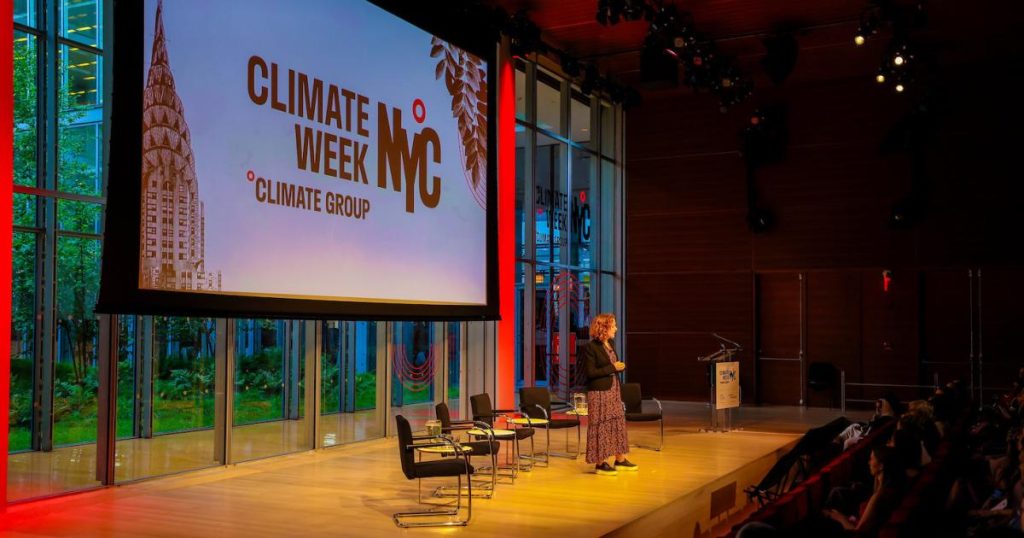Here’s your cheat sheet to navigate Climate Week
4 min read
Climate Week NYC, hosted each September alongside a high-level gathering of the U.N. General Assembly and a Climate Ambition Summit, is often billed as a warm-up event for the annual Conference of the Parties gathering where delegates bicker over climate policy.
Thousands of corporate sustainability professionals, government officials, nonprofit executives and activists will traipse between hundreds of events across New York City starting Sunday. There won’t be official negotiations on national climate policy, but there will be plenty of proclamations and meetings that have a bearing on corporate strategy.
While the central dialogues will be about delivering practical steps to halt and reverse climate change, other global concerns will permeate the discussions ranging from halting biodiversity loss to rethinking global food systems uplifting environmental justice to debating perhaps the biggest topic of them all — who should finance the just transition to a clean economy.
If you’re headed to New York, Climate Group, the primary organizer of Climate Week, has put together a comprehensive master calendar organized along 10 themes including energy, the built environment, food, industry and transport. Can’t make the trip? Not to worry: Many key presentations and programs include a virtual component. As you finalize your schedule, here’s a cheat sheet organized by three themes likely to drive the biggest headlines.
Civil society is weary of inaction and fossil fuel expansion
You can expect waves of climate activism throughout the week, starting with the March to End Fossil Fuels on Sunday, which will take place during the Climate Week NYC opening in midtown Manhattan.
The protest — one of more than 200 actions planned globally Friday and Sunday — aims to underscore the financial influence of oil and gas companies on climate policy, and to highlight government criminalization of climate-related protests in places including the United States and Europe. Indeed, you can expect to hear more throughout the week about the Fossil Fuel Non-Proliferation Treaty, organized by six Pacific nations, which proposes halting continued expansion of the oil and gas industry.
One theme that will pervade both the protest and the opening ceremony at 1 p.m. Sunday is a call to immediate action. The session, which can be joined virtually along with many other events throughout the week, will feature researchers, including the chief scientist of The Nature Conservancy, Katharine Hayhoe, and the chair of the Intergovernmental Panel on Climate Change, Jim Skea; high-ranking sustainability executives from L’Oreal (Alexandra Palt) and The Estee Lauder Companies (Nancy Mahon); and officials including Maryland Gov. Wes Moore.
Specific corporate strategies for driving action are the focus of the programming at The Hub Live on Monday and Tuesday, which features sessions on industrial decarbonization, fleet transitions and where to find the financing for these things. The sessions will be livestreamed.
If you want to hear more about specific climate tech solutions — ranging from carbon capture to circular economy enablers — head over to the Nest Climate Campus at the sprawling Javits Center. Highlighted main-stage speakers include Jonathan Foley, executive director of Project Drawdown, and 3M CSO Gayle Schueller.
Show up here if you’re responsible for nature strategy
The biggest news for nature next week is the official launch Saturday of the finalized reporting recommendations prepared by the Task Force for Nature-related Financial Disclosures during an invitation-only event at the New York Stock Exchange.
Sustainability teams tasked with developing nature-related strategies should head to the Nature Positive Hub organized by Nature4Climate from Monday to Wednesday, where the topics will range from the role of crediting markets (including ones for biodiversity) to financing to metrics for measuring progress. At deadline, the bad news is that many individual sessions were full, but virtual options were being offered.
Another big nature-related event to check out is the World Biodiversity Summit, where major themes will include public-private partnerships and orchestrating investments. (You can register for the digital event here.)
Catch up on progress toward the Sustainable Development Goals
It’s been seven years since the United Nations officially adopted the 17 Sustainable Development Goals, a global blueprint for “peace and prosperity for people and the planet, now and into the future.”
Many companies include specific commitments to these goals as part of their sustainability agenda pegged to a 2030 timeline. We’re at the midpoint of that movement, and progress has stalled for many reasons, including the worldwide economic impact of the COVID-19 pandemic and the war in Ukraine.
Expect scads of surveys and research reports taking stock of the adoption and financing gap — the latest annual report out this week from Force for Good figures the funding shortfall at $137 trillion. There are two places conversations about the outlook for the SDGs will dominate the discussions: The Leader Summit being hosted Tuesday by the U.N. Global Compact, the world’s largest voluntary business sustainability initiative, and the SDG Summit; and the U.N.-hosted SDG Summit on Monday and Tuesday. The event will be a centerpiece of the U.N. General Assembly, and you can expect the talks to center on reigniting action. If you haven’t registered already as an observer, you’re probably out of luck, but you can watch the proceedings here.





